

Home National Candidates About Us ARCHIVES SUBSCRIBE to Quarterly Analysis
Deep Democracy 3.0 Strategy & Listing Criteria Organizations & Endorsement Criteria
MASSACHUSETTS





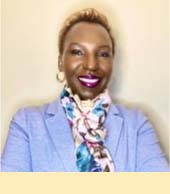
Vivian Birchall
Massachusetts House of Representatives, 14th Middlesex District
Vivian Birchall’s experience of community-building across the globe—from Uganda to Hawaii and now in Acton—has inspired her to run for public office. Born and raised in Western Uganda, Vivian has worked for different planning and development government agencies both in the United States and her country of birth. She has served as Executive Director to Africans in Boston and is currently a producer at Acton Community Television as well as a board member at Acton-Boxborough United Way. Through her day-to-day contact with Acton residents and community leaders, she has developed a deep understanding of the challenges faced by her electorate and the different needs of the towns that form district 14. Birchall highlights the importance of crafting legislation that benefits working people and creates the community infrastructure for a more resilient society that leaves no one behind. As one of the candidates that Senator Sonia Chang-Díaz included in her Courage Democrats slate, Vivian is part of a cohort of progressive candidates that are committed to raising the voices of minorities in Massachusetts.
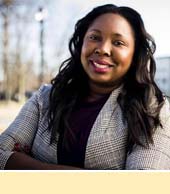
Eunice Zeigler
Massachusetts State Senate 1st Essex District (Haverhill, Lawrence, Methuen)
Eunice Zeigler is a first-generation Haitian American woman, a Methuen City Councilor, a municipal finance professional, and an artist running for State Senate in the Merrimack Valley’s newly redrawn First Essex District. Councilor Zeigler has a long record of public service in the Merrimack Valley, and has served in all three cities in the district. In addition to her work as a City Councilor in Methuen, she currently works as the Director of Advancement at the YWCA of Northeastern Massachusetts in Lawrence, and she previously served as Financial Compliance Manager for the City of Haverhill. Zeigler is an alumna of University of Massachusetts Lowell (BA and Master’s) and Boston University’s Questrom School of Business, and her experience in the state university system would make her a valuable ally for public higher education in the legislature.
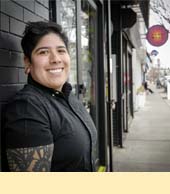
Sam Montaño
Massachusetts House of Representatives Candidate, 15th Suffolk District
Sam Montaño is a long-time organizer in and around Jamaica Plain. Montaño is Latina and identifies as gender queer and non-binary. Sam’s robust history of community organizing work precedes her. Montaño’s lived and professional experience inform her campaign priorities, from her focus on affordable housing to her commitment to improving mental health treatment options. Sam Montaño has served on the board of Hyde Square Task Force, chairing the JP neighborhood council, and sitting on the Advisory Board of the Southern JP Health Center. Sam currently serves as Director of Organizing for Greenroots, and previously spent seven years as a community organizer at the Jamaica Plain Neighborhood Development. Sonia Chang-Díaz selected Montaño as one of five “Courage Democrats,” and she is devoting her energy for the remainder of the cycle to electing her and other candidates on the slate.
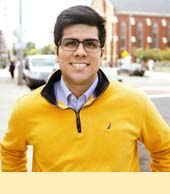
Roberto Jiménez Rivera
Massachusetts House of Representatives Candidate, 11th Suffolk District
Roberto Jiménez Rivera’s multicultural upbringing and his extensive involvement in community organizing propelled him to run for public office leading successful, inclusive campaigns. Jiménez Rivera was born in Norwood, Massachusetts to Puerto Rican parents and throughout his academic and professional path he has championed quality education for all. As a current at-large member of the Chelsea School Committee, he has been the highest vote-getter in that city for the last two elections. Roberto is an organizer with the Boston Teacher’s Union and his political project is motivated by his role as a parent and his commitment to building a better future for his 2-year-old son and every other member of the community.
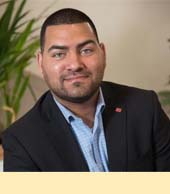
Raul Fernandez
Massachusetts House of Representatives Candidate, 15th Norfolk District
Raul Fernandez has a deep understanding of how public policy can support and impede thriving. Fernandez grew up in Spanish Harlem and the Bronx in a family of union transit workers. While Raul attended Bronx High School of Science, the public high school in his zoned district graduated fewer than 3 in 10 students. This contrast motivated his work around equitable education. Fernandez has extensive and varied experience in the education ecosystem; he holds a doctorate in education from Boston university where he is a lecturer in this subject area, he is also a member of SEIu Local 509. Raul’s commitment to quality education transcends academia as he serves on the state Department of Elementary and Secondary Education’s Racial Imbalance Advisory Council and served on the Brookline Select Board, where he was also elected Vice Chair by his peers. As part of his Select Board role, Fernandez pushed initiatives that helped Brookline reimagine policing, secure additional funding for public housing and fight identity-based harassment. Raul is one of five “Courage Democrats” that Sonia Chang-Díaz has chosen to support for the remainder of the election cycle.


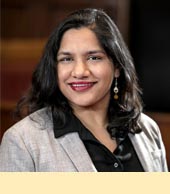
Sumbul Siddiqui
Mayor
Mayor Sumbul Siddiqui’s family moved to Cambridge from Karachi, Pakistan when she was two years old, and she grew up in Rindge Towers and Roosevelt Towers. She has been building power for youth leaders in Cambridge since she was a student in Cambridge Public Schools, where she served as Student Body President at the High school (CRLS); as a student, she co-founded the Cambridge Youth Involvement Subcommittee, which is now the Cambridge Youth Council.
Mayor Siddiqui’s career reflects this commitment to community power; before running for office, she was an attorney for low-income entrepreneurs and small business owners with Northeast Legal Aid. As Mayor, she has guided Cambridge through the pandemic, led a pilot of a universal basic income program, and chaired the City Council as they passed Cambridge’s Affordable Housing Overlay, which is already serving as a model for cities across the country. Mayor Siddiqui is seeking another term on the council to continue this work.
Key Priorities
-
Affordable Housing and Tenant Protections: As a City Councilor in 2019, Mayor Siddiqui chaired the Mayor’s Task Force on Tenant Displacement, which produced an extensive set of recommendations for action to prevent displacement in Cambridge. She also led the successful effort to secure city funding to preserve 504 expiring-use affordable homes at the Fresh Pond Apartments where she grew up, and helped pass the Affordable Housing Overlay.
-
Economic Development and Commerce: In keeping with her professional background as a legal aid attorney for small businesses, Mayor Siddiqui has fought to protect and expand opportunities for small businesses in Cambridge. As Mayor, she activated the Mayor’s Disaster Relief Fund to raise more than $5 million during the pandemic, of which $4.3 million has been distributed to 1518 businesses, arts organizations, individuals, and families.
-
Civic Engagement: Mayor Siddiqui’s approach to civic engagement brings residents from across the city into community together. She created Cambridge’s Community Iftar, bringing together more than 700 residents to celebrate the breaking of the fast during the holy month of Ramadan. She also co-created Cambridge Digs DEEP, a series of workshops on equity, privilege, diversity, inclusion, and race.
Deep Democracy Dynamics
Cambridge’s ranked choice voting system creates direct opportunities for deep democracy, especially for popular candidates like Mayor Siddiqui; in 2019, she exceeded the quota for election by 392 votes on the first count, and 149 of these votes transferred to help elect Councilors Denise Simmons and Alanna Mallon, who are both close colleagues of Mayor Siddiqui on the council. High turnout in Mayor Siddiqui’s strongest precincts also helped elect Ayesha Wilson to the School Committee in 2019 — for example, in 11-1, which includes the Fresh Pond Apartments Mayor Siddiqui fought to preserve, she earned 46% of #1 votes in a 22-candidate field, Member Wilson earned 37% as a challenger, and each both drove and benefited from strong turnout.
Campaign Team and the Field
Mayor Siddiqui’s campaign team includes paid youth organizers, one of whom is the current student representative to the School Committee in Cambridge, and she is committed to building youth leadership in Cambridge. She also personally knocks on thousands of doors each cycle to build lasting relationships with residents across the city, including mine!
In Cambridge’s at-large proportional representation system, every election is highly competitive and every incumbent is at some risk every year, as supporters may think they are “safe” and vote for someone else #1. Strong challengers this year include Theodora Skeadas and Paul Toner, and Skeadas may have enough potential base overlap with Mayor Siddiqui to present a risk, even with the Mayor’s strong 2017 and 2019 performances. Fundraising now will help Mayor Siddiqui secure #1 vote commitments early.
Fundraising & Opportunities for Giving
So far this year, Mayor Siddiqui has raised $26,000, with 68% coming from Cambridge residents. This shows that she is on track to meet her spending level from her 2019 campaign, in which she spent just over $27,000, and additional contributions will allow her to reach more voters. Click here to contribute!
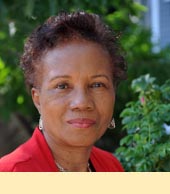
Denise Simmons
City Council
Councilor Denise Simmons has devoted her entire career to public service in Cambridge — in the 1980s as the Executive Director of the city’s Civic Unity Committee, in the 1990s as a member of the Cambridge School Committee, and since 2001 as a Cambridge City Councilor. During her time on the Council, she was twice elected Mayor by her colleagues, and was the first Black woman to serve as a Mayor in Massachusetts history and the first openly lesbian Black mayor in the United States. In her time in public office, she has been devoted to increasing access to affordable housing, securing educational opportunity for every student in Cambridge Public Schools, building civic unity, and supporting local businesses, and her last term includes major policy accomplishments on these long-term priorities. She prides herself on her collaborative approach to public service, and the relationships and trust she has built throughout the city make her an essential part of the Council’s legislative process.
Key Priorities
-
Housing: Councilor Simmons has fought for the Affordable Housing Overlay for years as Chair of the council’s Housing Committee, and was instrumental in its passage this term. The Overlay has already added more than 350 affordable homes to Cambridge’s development pipeline, and is a signature accomplishment for Simmons. As Mayor in 2017, she introduced a Comprehensive Housing Plan calling for increased investment in affordable housing and tenant protections and reforms throughout housing and zoning in Cambridge, and has implemented aspects of it — including the AHO — since then.
-
Civic Unity: Councilor Simmons consistently brings residents together in community in the face of tragedy, most recently by leading a vigil with mothers who have lost children to gun violence in the city this year. As Chair of the Civic Unity committee and as Mayor in 2016 and 2017, she has also convened community conversations about race, class, gender, and cultural identity in Cambridge.
-
Education: As a former School Committee member who chaired the School Committee for two terms as Mayor, Councilor Simmons has long sought to close gaps in educational opportunity in the Cambridge Public School District. As Finance Committee chair on the Council, she supports increasing school funding, but she has also used this role to argue that the schools need stronger focus on supporting students of color in Cambridge. She also founded Girls Only Leadership Development (GOLD), a free weekly leadership development program for 8th-grade girls offered through YWCA Cambridge.
Deep Democracy Dynamics
Like Mayor Siddiqui, Councilor Simmons has been a popular elected official in Cambridge in many past cycles, and her surplus votes have transferred to values-aligned candidates in several recent cycles. In 2019, 800 Cambridge voters ranked Councilor Simmons and Mayor Siddiqui as their top two choices; a Deep Democracy nexus like this can help stabilize incumbents drawing from a similar voter base in Cambridge’s proportional representation system, since one candidate can exceed the quota for election on the first count and boost the other through surplus transfers.
Campaign Team and the Field
Councilor Simmons’ campaign manager is Cecilia Szkutak, an Act On Mass alum. Like Mayor Siddiqui, Councilor Simmons faces a competitive reelection campaign in Cambridge’s at-large proportional representation system, but she has earned the trust of voters throughout the city over decades, and generally has a stable base of supporters in local elections.
Fundraising & Opportunities for Giving
Councilor Simmons has raised $21,000 so far this cycle, and has $17,000 on hand going into the fall. Cambridge City Council elections require extensive spending on field, since every candidate runs at large against twenty other candidates, and additional resources now will allow Councilor Simmons to reach more voters and expand her base this year. Click here to contribute!
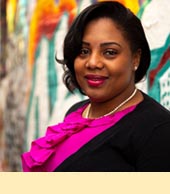
Ayesha Wilson
School Committee
School Committee Member Ayesha Wilson has been working with Cambridge youth and families for twenty years, starting just after she graduated from Cambridge Rindge and Latin School (CRLS)in the class of 2000. She now holds a Masters in Social Work, and is a Senior Teacher-Counselor with the Cambridge Housing Authority’s The Work Force program, of which she is an alumna. Through the program, she counsels and mentors young people who are residents of Cambridge Housing Authority homes.
Ayesha is the only social worker on the School Committee, and helped add nine new social workers to the school budget in her first term; this work and her past professional experience earned her an endorsement from the National Association of Social Workers’ Massachusetts political branch. Her position working at CRLS every day without being a school employee gives her a unique perspective on the district’s needs, and she is fighting to build an anti racist school system and embed equity in every aspect of rebuilding after the pandemic.
Key Priorities
-
Student Mental Health: In her first term, Ayesha has advocated for more social workers in both budget cycles, helping add nine new social workers to CPSD. In her next term, she plans to support student wellness with a new mental health curriculum at every grade level.
-
Making CPSD an anti-racist district: In her first term, Ayesha co-wrote policy to make racial equity a top priority for CPSD. This resolution drove investment in the Office of Equity, Inclusion, and Belonging and shaped the district’s new anti-racist vision and mission statements.
-
Mentorship programs for postgraduate success: Ayesha has proposed a 1-1 mentoring “champion for every child” initiative and pushed for Individualized Success Planning to help every CPSD graduate build a post-secondary education or career plan.
-
Universal Pre-K: Ayesha will work with city councilors to implement Universal Pre-K by the 2023-2024 school year.
Deep Democracy Dynamics
Ayesha Wilson has structured her campaign this year around long-term political power-building for young people of color in Cambridge, canceling her digital ad spending to hire three paid fellows and investing heavily in door-to-door and phone programs. In 2019, she placed particular emphasis on turning out young voters and new voters in Cambridge’s public housing neighborhoods, and this approach earned her 2,692 #1 votes, more than any first-time candidate for Cambridge School Committee in the past twenty years. Her campaign approach helps prove the power of Deep Democracy as an organizing approach.
Campaign Team and the Field
Ayesha’s 2019 Treasurer and Campaign Manager have both returned to the team this year, joining three new organizing fellows who are current Cambridge Public School students. The field will be competitive, as challenger Caroline Hunter brings deep roots in Cambridge education politics and challenger Akriti Bhambi brings a political and fundraising network from her time as chief of staff to State Representative Marjorie Decker. First-time incumbents also face unique challenges in Cambridge and frequently lose reelection because their base voters see them as safe and they are still building city-wide networks and name recognition, so this cycle is particularly vital for Ayesha Wilson.
Fundraising & Opportunities for Giving
Because Ayesha Wilson is a public employee for the Cambridge Housing Authority, she is not allowed to directly solicit contributions, and must rely on fundraising from her community of supporters. She has raised more than $9000 for this cycle with this approach through 161 contributions, a reflection of the enthusiasm for her among her supporters, but will need to raise more money in order to expand funding for her youth interns program and maintain the power-building pipeline she has built for young people in Cambridge. Click here to contribute!

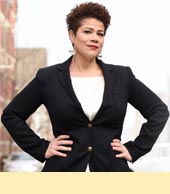
Julia Mejia
Boston City Council, At-Large
Councilor Julia Mejia is currently in her first term as a Boston City Councilor At-Large, and she is Boston’s first Dominican and Afro-Latina City Councilor. Before joining the council, she founded and led education and voter registration nonprofit groups and worked on MTV’s social justice campaigns. Councilor Julia Mejia moved from the Dominican Republic to Dorchester when she was five years old, and graduated from Dorchester High School and Mount Ida College, becoming the first person in her family to graduate from high school and college.
Policy
As the chair of the council’s committees on Civil Rights and on Small Business and Workforce Development and throughout her service, Councilor Mejia takes an inside-outside approach to governance, wherein community conversations drive her policy priorities. When she is working on an issue, she works to assemble a coalition of stakeholder groups and individuals to guide her policy direction, inform the questions she asks in hearings, and organize to attend public meetings.
-
Education: Councilor Mejia sees educational justice as a top priority for the next council, and hopes to chair the council’s education committee. This is another area where she would employ her inside-outside approach, and she is currently working to identify partner organizations to help her shape policy through the lens of racial justice.
-
Housing: Councilor Mejia also prioritizes housing affordability, and hopes to be Chair or Vice Chair on housing and development. She hopes to reframe city conversations around affordable housing to focus on what the city needs, rather than on the minimum which can be secured from developers. She pointed to increasing the IDP percentage and more local approaches to understanding Area Median Income in the policy process as two mechanisms for getting there, and also supports re-instituting rent control. She also identified homeownership as an important tool for building generational wealth.
-
Accessibility, Accountability, Transparency, and Civic Engagement: In her first term, Councilor Mejia has worked to facilitate community conversations across issue areas, and her work on the council focuses on opening access to government through public meetings, direct engagement events, videos, infographics, summits, and other media.
Deep Democracy Dynamics
Councilor Mejia has embedded her philosophy of civic engagement in every aspect of her campaign. She prioritizes turning out voters in precincts with lower-than-average turnout because she believes that power builds in communities where people vote; even if they do not directly elect their preferred candidate every time, they establish themselves as electoral forces and force existing power structures to work with them on their priorities.
Councilor Mejia is also building partnerships with movement candidates in Boston; she has endorsed Kendra Hicks in District 6, and would be excited to work closely with her on the council. District 6 includes many of Councilor Mejia’s own strongest precincts in Wards 10, 11, and 19 in Jamaica Plain, and these precincts are also key base areas in Kendra Hicks’s campaign. Councilor Mejia has strong partnerships with Right to the City Vote and each of its constituent organizations, which are consistently invested in long-term power-building.
Campaign Team and the Field
Councilor Mejia sees her campaign as a key opportunity for building sustainable movement power; she noted that she created the Political Lab with support from Maria’s List and other funders to train first-time candidates and campaign staff of color, and her campaign manager Jaquell Sneed is an alum of this program. On the whole, Councilor Mejia sees hiring as a major area of potential power-building; a majority of her staff are women and a majority are people of color. She also builds pathways into paid roles for people she meets through organizing spaces and community events.
She will need this strong team to help her build on the city-wide coalition which elected her in 2019. Councilor Mejia earned 22,492 votes in Boston’s 2019 at-large race, and she needed every one to get elected, edging out Alejandra St. Guillen by one vote in the recount. Mejia’s power base in 2019 centered on Jamaica Plain and Mission Hill; more than half of all voters in these neighborhoods cast votes for her, and wards 10, 11, and 19 alone provided nearly a quarter of her citywide vote total. She also performed well across Roxbury and North Dorchester, earning at least 40% of ballots in 7 more wards.
In a one-vote victory, a vote from an opponent’s base area means just as much as a vote in your own, and Mejia’s path to victory also stemmed from her ability to win votes in her areas of weakness. While she struggled in Boston’s most segregated white neighborhoods — only one in eight South Boston voters included her on their ballots, and fewer than one in five in Charlestown-based Ward 2 and Neponset-based Ward 16 — she earned votes in every neighborhood, lifting her to a narrow city-wide victory.
Councilor Mejia is seeking reelection in a packed at-large field, with more than a dozen candidates on the ballot; she has the city-wide support and infrastructure to win handily, but her status as a first-time incumbent seeking reelection and her commitment to reinvesting campaign resources in building long-term community power each make her campaign worthy of investment.
Fundraising & Opportunities for Giving
The campaign’s fundraising strategy pairs quarterly large fundraisers where she highlights specific constituencies — for example, a Women in Politics fundraiser and a youth power fundraiser — with smaller house parties and community events. Through this strategy, she has raised $181,603 since the beginning of 2020, including $104,000 from 798 Boston donations. Councilor Mejia uses each event to build broader power related to the constituency she is highlighting — for example, her Youth event specifically raises money to hire young people to work on the campaign in paid roles.
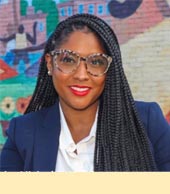
Kendra Hicks
Boston City Council, District 6
Kendra Hicks has been a Boston organizer for decades, co-founding the Beantown Society as a first-year student at English High School in District 6 after graduating from Curley Middle School. She is now the Director of Radical Philanthropy at Resist. She has also devoted her career to promoting health, safety, and justice in District 6 and across the city, working as a street worker interrupting community violence before joining the Boston Public Health Commission’s Racial Justice and Health Equity Initiative, working to promote justice and equity through city policy. As a Boston Public Schools parent and as the only candidate in the race who is a renter, she has experienced many of the systems administered by city government as a constituent, and this lived experience would inform her governing approach.
Policy
Kendra Hicks has released a 36-point “policy platform for a thriving city, healthy people, and a livable planet” across key areas including educational, housing, and environmental justice. On the whole, she sees structural racism as a key obstacle to building just and equitable policies in Boston, and believes that remedying it will require focusing the city on the shared project of dismantling structural oppression upstream in the policy process. Among others, her key priorities include:
-
Repaying Boston’s Education Debt to Black and Brown Students: Her top priority in this area is returning to an elected School Committee, and she also would pursue educational budget justice through baseline budgeting and budget transparency, invest in physical and educational infrastructure through modernized school buildings and expanded voc-tech pathways, and disrupt the school to prison pipeline by eliminating the BRIC, removing SROs from schools, and ending all coordination between schools and ICE.
-
Community Safety: Kendra Hicks’ approach to community safety would prioritize interventions grounded in community leadership and public health; she would preserve and expand existing street worker programs and shift budgetary control of these community safety programs out of BPD. She also would take a public health approach to opiate harm reduction, and supports supervised consumption sites.
-
Housing Justice: Kendra Hicks’ approach to housing affordability centers on “giving Boston’s housing need a voice” through wider neighborhood consultation on projects beyond immediate abutters, more representative housing boards and commissions, and anti-displacement zones with special standards for community control. She also supports restoring rent control and supports ending mandatory parking minimums for affordable homes.
On the whole, Hicks stated that her “personal theory of change is that the people who are most directly impacted should be at the center of decision making” and wrote on her website that she is committed to “bringing the margins to the center” evoking Ayanna Pressley’s stance that people closest to the pain should be closest to the power.
Deep Democracy Dynamics
Kendra Hicks framed “deepening democracy” as a key goal of her campaign, and noted that she has already employed it as a policy approach by building six policy ideation teams comprising community organizations and stakeholders to guide each of her six key policy areas. This approach reflects her commitment to building policy in partnership with community groups while in office.
Kendra Hicks would be excited to work with Julia Mejia, Ruthzee Louijeune, and David Halbert on the council, and sees her campaign organizing in District 6 helping boost progressive At-Large and Mayoral candidates in the preliminary and general elections. She has also been endorsed by District 5 Councilor Ricardo Arroyo.
Campaign Team and the Field
Kendra Hicks’s campaign team includes leading progressive political organizers in Boston: her campaign manager is Tonya Tedesco and her field director is Anthony Collins. She is also using her campaign to empower and train young people, and currently pays 7 fellows $15 per hour for their work. The campaign does six days a week of voter contact, including three canvasses and three phone banks.
Kendra Hicks initially launched her campaign as a challenge to incumbent Councilor Matt O’Malley. Since then, O’Malley opted not to seek reelection, and her main opponent is now Mary Tamer, a pro-charter school activist and former School Committee member.
District 6 is incredibly politically diverse, with 22 precincts in Jamaica Plain’s 3 wards (10, 11, and 19) and 16 in West Roxbury’s Ward 20. While Jamaica Plain is known as a progressive liberal urban hub, West Roxbury is a moderate conservative suburb. In 2019, Julia Mejia, who shares many of Kendra Hicks’ policy positions, placed second overall behind Michelle Wu in the At-Large race in Wards 10 and 11 and third in Ward 19 behind Wu and Alejandra St. Guillen, another progressive candidate. In West Roxbury’s Ward 20, however, she placed 7th, beating only David Halbert and reflecting the neighborhood’s conservative lean. The Hicks campaign has worked to solidify its base in JP while appealing to West Roxbury voters through direct outreach and messaging around shared values.
In the uncontested 2019 district race, 54.3% of the district’s votes were cast in JP, while the remaining 45.7% were cast in West Roxbury. Hicks’ base is in JP, while her main opponent, Mary Tamer, is based in West Roxbury; either candidate would need to win their own neighborhood by a large margin and limit their losses in the other neighborhood to a small margin in order to win.
Fundraising & Opportunities for Giving
According to an analysis by Anthony Collins, Field Director for Hicks, she is the only candidate who has earned donations in every precinct in the district. So far, she has raised $135K of her $150K goal, largely through her team of over 100 monthly donors, and she also relies on house parties and small events throughout the district. She accepts contributions through her ActBlue. An additional $15,000 before preliminary election day on Tuesday, September 14th can help fund a grassroots operation to deliver on the potential of what activists, leaders, and voters have forged together over the last year.
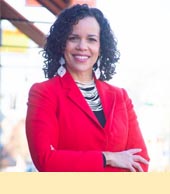
Kelly Bates
Boston, At-Large
Kelly Bates is a problem-solver, a crisis management leader, a civic rights champion, an attorney, and a mom based in Hyde Park. She has twenty-five years of experience leading advocacy organizations, fighting for racial justice, women and girls, and electoral equity, and is running to bring her vision, values, will, and skill to the Boston City Council.
Key Priorities
-
Affordable Housing: Kelly Bates is committed to using every tool in our toolbox to address the housing crisis, including zoning reform, housing production, and rent control. She will fight to end homelessness, expand opportunities for affordable homeownership, and hold developers to their commitments on employing Boston residents and contracting firms owned by women and people of color.
-
Public Health: Kelly Bates believes that Boston needs a trauma-informed response to community violence, and would divert funding from police overtime into wrap-around response teams. She supports increasing funding for youth jobs and community health centers and hospitals.
-
Schools and Young People: Kelly Bates supports an elected school committee, equitable admissions for exam schools, building pipelines into teaching for Boston students, and investing in mental health resources with more school psychologists, social workers, and guidance councilors.
Campaign Team and the Field
Kelly Bates made early investments in staffing, and has built a campaign team powered by women and people of color. Her campaign manager, Shibani Chakrabarty, has extensive experience in field organizing on state and national campaigns, most recently with Jon Ossoff in Georgia, and the Bates campaign has built a field operation knocking thousands of doors around Boston. In a highly competitive at-large race with two open seats, this could prove decisive.
Fundraising & Opportunities for Giving
Kelly Bates has built one of the most successful fundraising operations of the cycle, raising $187,000 from nearly 1000 individual donors. More than half of these donors live in Boston, including in many of the key swing neighborhoods she will need to win on election day. She accepts contributions through her ActBlue.
Right to the City Vote
Boston’s Right to the City Coalition brings together movement organizations from across neighborhoods and issue areas — Alternatives for Community and Environment, Boston Workers Alliance, Chinese Progressive Association, City Life/Vida Urbana, New England United 4 Justice, and Neighbors United for a Better East Boston — to fight for social, economic, and racial justice in Boston, with a specific focus on fighting gentrification and displacement. Their approach centers around base-building, and they work to build sustainable movement power, both for the coalition as a whole and for each of its constituent groups.
Right to the City Vote, the coalition’s 501(c)4 affiliate, brings this approach to Boston’s electoral politics and to year-round civic engagement. In 2019, RTCV made nearly 20,000 contact attempts to 10,000 unique voters, playing a key role in electing Councilor Julia Mejia and three endorsed district candidates. Since then, they have focused on issue organizing and power-building and on preparing for the 2021 election, in which they have endorsed Mayor Kim Janey and Council candidates Julia Mejia and David Halbert in the at-large race and Joel Richards and Tania Anderson, district candidates in two priority districts. They describe their work as “building upon years of local base-building and multiracial collaboration on a collective policy agenda.” They rely on individual contributions to fund compensation, fliers, and phone-banking expenses, and accept contributions through their ActBlue page.


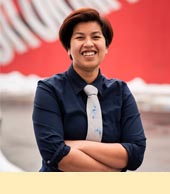
Thu Nguyen
Worcester City Council, At-Large
Thu is a proud Vietnamese refugee, auntie, artist, youth worker, and the first non-binary candidate for Worcester City Council At-Large. They have devoted their career in Worcester to youth work and community organizing, returning to their alma mater — Worcester Public Schools’ Claremont Academy — after college as a youth worker and devoting the next decade of their career to serving young people in Worcester in many roles.
This year, they are running for an At-Large city council seat to activate the young Worcester voters who have too often been shut out of local politics in the city. Their campaign reflects this philosophy and their commitment to “doing economic justice” through politics, as they plan to build a paid youth program for canvassing and shaping campaign strategy and operations. Thu’s campaign strategy emphasizes building paid pathways into organizing for Worcester youth, and they see this as part of building a durable long-term movement.
Key Policies Priorities
-
Education: Based on their time as a youth worker, Thu sees schools as a vital part of healthy life for young people in Worcester, and supports increasing school funding to support additional investment in school counselors and greater overall investment in public education in Worcester.
-
Housing: Thu plans to draw on policy tools available to the city council to center housing affordability, including stronger community benefits agreements for new developments and more pathways into homeownership for low- and moderate-income residents. They also hope to refocus investment in neighborhoods, rather than solely prioritizing Worcester’s downtown for housing investment and economic development.
-
Community Safety: As a councilor, Thu would push the city to “Invest in our young people to prevent violence through programming and jobs,” and they see programs to address the root causes of crime and policy as the strongest path to community safety. They also would push for a civilian review board for Worcester police and additional transparency in the police department and across government.
Deep Democracy Dynamics
Thu represents a rare case of an elected official who would remain fully accountable to the movement that elected them when in office. Thu’s experience as a youth worker and a mutual aid organizer in Worcester has built them a deep network of supporters, and they would remain attached to this organizing network as a councilor. This movement-first approach is also evident in Thu’s campaign structure, as they committed to hiring paid youth to build the pipeline into movement organizing in Worcester.
We have seen how movement organizing in Massachusetts’s major Gateway Cities can yield major Deep Democracy victories. In Springfield, movement-aligned City Councilors have recently ascended to State Senate and State Representative seats. These wins, however, require committed local politicians who can win municipal elections and bring the movement with them into office. By running at-large and investing in voter contact, movement-building, and a network of small donors based in the city, Thu is building the infrastructure that can power such a transformation in Worcester.
Campaign Team and the Field
Thu’s campaign manager is Kalifa Foreman, and they have also worked with long-time Worcester leader Marianna Islam in shaping their campaign. Thu has also been designated as a Rising Star for 2021 by Mass Alliance.
Thu’s campaign represents a direct challenge to the established power structure in Worcester politics. Incumbent councilor Donna Colorio first won her seat in 2019 by a narrow margin after benefiting from $38,130 in spending from the Baker-aligned Massachusetts Majority PAC over the last two weeks of the cycle. While there is an open seat this term, incumbent councilor Matthew Wally is vacating his district seat to run at-large. Rather than relying on PAC spending or entrenched incumbency to power their victory, Thu has built an impressive grassroots operation within Worcester, with 386 individual contributions from within the city as of mid-July.
Fundraising & Opportunities for Giving
Thu’s campaign has raised $35,000 as of mid-July, and additional investment will help them build out their core team of youth supporters. Thu’s grassroots vision means that contributions in this race will help build the long-term pipeline among young people in Worcester this cycle and beyond. Thu accepts contributions through their ActBlue.
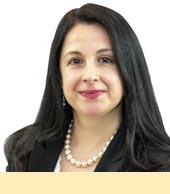
Etel Haxhiaj
Worcester City Council, District 5
Etel Haxhiaj first came to Worcester to attend Clark University after fleeing political violence in Albania and living as an undocumented person in Greece. She found a welcoming community in Worcester, and these experiences have motivated her to dedicate her career to public service in the city.
In sixteen years, this career of service led her to the Attorney General’s office, where she worked in consumer protection, and to the Central Massachusetts Housing Alliance, where she helped families navigate shelter and housing systems as a case manager and now leads public education and advocacy campaigns. More locally, it has also led her to serve on Worcester’s Community Development Block Grant committee and on the board of the Central Massachusetts YWCA.
Both these professional experiences and her lived experience as a working single parent of two kids in Worcester Public Schools and as an immigrant to Worcester guide her approach to politics, and she is working to make Worcester’s government and public institutions more representative of, and responsive to, the communities they serve.
Key Policies Priorities
-
Housing Affordability: Etel hopes to use Worcester’s coming citywide master-planning process to build a long-term roadmap for housing affordability. She is also pushing to create an affordable housing trust fund for Worcester as a mechanism to end homelessness.
-
Police Reform: As Councilor, Etel would push to create a Civilian Review Board as a disciplinary body for the police. She also supports removing SROs from schools, and would seek opportunities to reinvest in social services rather than additional police. She also opposes Worcester’s recent purchase of ShotSpotter.
-
Climate Action: Etel would be a staunch advocate for planned investments in solar and wind energy in Worcester, and has organized with Mothers Out Front in Worcester.
-
Walkability: Etel cited walkability as a top priority, and would look for opportunities to make Worcester’s streets safer for pedestrians as a councilor
Deep Democracy Dynamics
In a potentially transformative year of Worcester elections, Etel has a strong relationship with at-large candidate Thu Nguyen, having worked with them through Mutual Aid Worcester. In separate conversations, each candidate cited the other as someone they would like to work with on the councilor. Movement-driven candidates are often most successful when they have a cohort of peers in office, and this year in Worcester represents a strong opportunity for such a result. Strong collaboration forged in community organizing aligns with Deep Democracy.
Importantly, Etel also noted that she doesn’t plan to hold the seat for decades, and would work to recruit additional movement candidates to replace her down the road. Such an approach is key to building lasting movement power. Etel is well positioned to break down barriers in Worcester and build pathways that bring others into office with and after her.
Campaign Team and the Field
Etel sees her campaign as part of a larger project of building infrastructure in Worcester, and her approach to past campaigns reflects her commitment to this philosophy. Running at-large in 2019, she paid thousands of dollars to ten youth from Worcester Public Schools for stipend internships, and spoke about the importance of building sustainable movements through paid work to make electoral organizing accessible to more Worcester residents. She intends to take a similar approach this year.
Though she mentioned that her experience as an undocumented refugee informs her approach to politics, Haxhiaj also brought up her limited perspective as a white candidate, and her campaign team includes a 19-member kitchen cabinet that is majority residents of color.
Etel will face a four-way preliminary election for this open seat on September 21st. Among her opponents are retired police officer Gregory Stratman, who is running to lower taxes and “defend, not defund” Worcester police, Steve Quist, and Yenni Desroches.
Etel’s strong showing as a 2019 at-large candidate may also boost her, as she has already earned trust and built name recognition in the 5th district. Across the district’s two wards, she earned 1884 total votes in 2019, well over halfway to her win number this year, and is poised to expand on this performance in 2021.
Fundraising & Opportunities for Giving
Etel has raised $23,000 so far this cycle, powered mainly by 259 individual contributions from Worcester residents totaling $16,383. She hopes to raise $30K total to hire a field organizer and increase her spending on direct voter outreach and on compensation for student campaign workers on her team. She accepts contributions through her ActBlue page.

Worcester Interfaith
Since it was founded in 1993, Worcester Interfaith has worked to build community coalitions to build power for issue campaigns aimed at building racial and economic justice in Worcester. After a strategic planning process in 2018, they hired Executive Director Isabel Gonzalez-Webster, a long-time Worcester community leader who has built an extensive relational organizing approach at the organization. Under her leadership, Worcester Interfaith relies on deep community relationships to guide and drive its issue-organizing projects.
One of Worcester Interfaith’s major ongoing organizing efforts aims to address unjust suspensions and expulsions in Worcester Public Schools; this effort typifies their relational approach to organizing, where they set priorities based on community relationships and build coalitions of local and state groups and individuals to achieve them. In fall 2018, Worcester Interfaith heard from parents of WPS students facing unjust suspensions and expulsions. Based on this, they formed the Worcester Coalition for Education Equity. Worcester’s school committee is unrepresentative of the student body—70% of WPS students are students of color, while 100% of the school committee is white. Inspired by Lowell’s successful voting rights lawsuit, Worcester Interfaith Executive Director Isabel Gonzalez-Webster spoke with Lawyers for Civil Rights and worked with them to file a lawsuit against the city for its all-at-large School Committee election system. This effort shows the vital role Worcester Interfaith plays in Worcester’s organizing landscape, bringing together residents, community institutions, and statewide organizations to push for justice on issues of community concern.
This model also made Worcester Interfaith a vital community resource during the pandemic, helping residents access testing, emergency assistance resources, and vaccination through their Cultural Brokers program. After rapidly expanding their scope to respond to community needs, they are focused on building lasting sustainability for the organizing infrastructure they have built, and unrestricted contributions to their 501(c)3 are vital in this work. This relational approach also guides their 501(c)3 civic engagement work, as they share voter information and promote turnout ahead of this year’s municipal elections.
On the whole, Worcester Interfaith operates as a convener for key coalitions in Worcester and around Central Massachusetts—including as a Democracy HUBS anchor organization—and as an infrastructure and base for community power in the city. They will play a vital role in any progressive movement in Worcester, and funding now can help them build long-term sustainability. Worcester Interfaith accepts contributions.

DEEP DEMOCRACY
Power Building in Springfield, Massachusetts
June 2021

Read here about our strategy, research, and endorsement criteria for Maria's List Massachusetts in 2021.


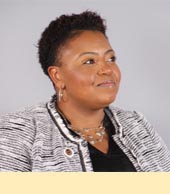
Jynai McDonald
Springfield City Council, Ward 4
Jynai McDonald was born and raised in Springfield, and is the mother of three children. McDonald states that she has “always been an activist,” organizing as a high school student in Springfield and serving as a Youth Advisor to the Urban League of Greater Springfield and as a Site Director for the YMCA of Greater Springfield before attending Bay Path University.
After graduating from Bay Path University, McDonald centered her career on organizing and on child-care policy. She currently serves as Family Care Coordinator for SEIU Local 509 where she runs a department that provides representation, training, and services for approximately 2,400 Family Child Care providers throughout Massachusetts. McDonald also serves on the steering committee for the Common Start bill — a House bill to produce accessible, affordable, and high-quality early education and care — and as Western Mass Regional Coordinator for the Common Start Coalition. She was also recently appointed to the Governor’s Early Education and Care Economic Review Commission.
McDonald credits her organizing work with Western Massachusetts Neighbor to Neighbor with inspiring her to run for elected office, and says that she learned the power of policy to change people’s lives and of community organizing to hold elected officials accountable.
Key Policies Priorities
-
Economic Development: McDonald wants to take a holistic approach to economic development. She plans to expand and support the Springfield Food Policy Council, which has worked with the city on food access and urban farming. McDonald also believes there is an opportunity to connect more Springfield youth to existing businesses and business opportunities in the city. She is also particularly focused on business development for entrepreneurs of color and noted that the city often only sees food- and service-sector businesses of color as viable and needs to help cultivate those in other sectors.
-
Education: In keeping with her professional experience, McDonald also sees early education and care as a key priority for the city. She is fighting for state-level funding through the Common Start Coalition and serving on the governor’s Early Education and Care Economic Review Commission to explore statewide solutions, and believes Springfield can also act on a local level to push for additional funding.
-
Policing and Public Safety: McDonald sees policing as a critical issue, and has experienced excessive force from the Springfield Police Department. She has pushed for police reform through her work with the Pioneer Valley Project and would continue this work on the council. A critical piece of her policing platform includes pushing back against the Mayor’s attempts to weaken or eliminate the Community Police Relations Committee. McDonald also hopes to strengthen the commission’s ability to sanction police for misconduct. She believes building alternative response programs for mental health crises so that certified mental health professionals and ambulances can respond instead of police.
-
Housing: McDonald supports rent control and would also look to institute development linkage fees to secure additional funding for housing. She would also prioritize building pathways into homeownership for people of color.
Deep Democracy Dynamics
Ward 4 is overwhelmingly Democratic, but Democrats in the ward split roughly evenly between progressive and moderate voters. In the 2020 primary, President Biden earned 42% of the vote, followed by Bernie Sanders with 32% and Elizabeth Warren with 13%. Ward 4’s residents are predominantly people of color. Based on American Community Survey data, approximately 44% of residents identify as Hispanic or Latino, while 33% are non-Hispanic Black and 19% are non-Hispanic White.
Neighbor to Neighbor, the Springfield NAACP, and the Pioneer Valley Project are three major organizations mobilizing around justice issues in the ward and the city. McDonald is a member of N2N and serves on the Board of Directors for PVP.
As a member of Western Massachusetts Neighbor to Neighbor, McDonald credits them with inspiring her to enter electoral politics; she has been organizing with them for years and has strong relationships with their organizers and with progressive elected officials whom she met through the organization. As a union organizer, McDonald has experience building coalitions and mobilizing power, and she is already working to shape policy through state level organizing inside and outside of government. They are providing translation assistance to help her reach Spanish-speaking voters, as well as other organizing support.
Given the movement electoral success of 2020 in Springfield, McDonald’s races alongside that of Lezlie Braxton Campbell in the Ward 3 race and Zaida Govan in Ward 8 makes Springfield a great case for short term and long term political and civic engagement. Our electoral modeling, centered in both demographic and historical electoral data, finds Springfield and Ward 4 to present key strategic opportunities for progressive gains. With it's combination of voters of color, young people, and past primary electoral results, our Deep Democracy analysis indicates that investments in power-building in Springfield and other Gateway Cities will be vital in building progressive power.
These factors present a strong potential for Deep Democracy effects in Springfield this cycle, both through collaboration between ward candidates and through alignment with progressive incumbents of color in the at-large race. This Deep Democracy alignment is deepened by the connection between each Maria’s List candidate and Neighbor to Neighbor specifically.
Campaign Team and the Field
McDonald has substantial experience as a candidate. In addition to her 2019 campaign, McDonald sought an at-large seat in 2017 and qualified for the general election. She placed last in November, but beat her citywide numbers in every Ward 4 precinct and performed strongly in the ward overall. Being on the ballot previously will allow her to have an increased name ID and a tested volunteer base. McDonald has been designated as a Rising Star by Mass Alliance.
McDonald’s only opponent is first-term incumbent Malo Brown, whom she argues has failed to represent the district effectively in his first term on the council. Both candidates have automatically advanced to the general election on November 2nd.
Fundraising & Opportunities for Giving
Jynai McDonald had raised $10,000 as of the April 30th fundraising deadline, over halfway to her baseline campaign budget of $20,000. In a historically low-turnout ward race, she plans to invest in organizing to expand the electorate. After narrowly losing to Malo Brown in 2019, McDonald has far outraised him this year, but must still raise additional resources to fund her full voter outreach operation. She accepts contributions through her ActBlue.
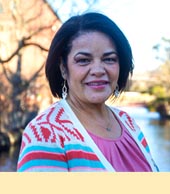
Zaida Govan
Springfield City Council, Ward 8
Zaida Govan, a lifelong Springfield resident who moved from Puerto Rico when she was just three years old, has the lived experience and leadership background to be a bold leader in this predominantly Black and Latino ward in Springfield.
After graduating from the Springfield Public Schools and enrolling in college, Govan experienced assault, addiction, and incarceration; this time in her life taught her that "structural racism is embedded in the fabric of every policy in our country," and she has devoted herself to dismantling it in her work since then. She completed her bachelor’s degree at Springfield College as a single mother while working full time, and later went on to earn her Master’s degree in Social Work from Springfield College. A former licensed social worker and addiction treatment counselor for a correctional facility similar to the one she was once in. She is also a board member at Choice Recovery Coaching, which centers a culture of recovery with equity and justice for individuals struggling with addiction and the families who support them.
Govan’s work has centered on racial and economic justice in Springfield, as she served as President of the Springfield Community Land Trust and as a board member of the Wellspring Collaborative. Her community leadership in the city has also centered on Indian Orchard, which is a majority Black and Latino community. She is currently President of the Indian Orchard Citizens Council, where she created the Annual Food Truck festival and has prioritized clean-ups and beautification.
Govan is running for City Council because she wants to elevate her mission to continue to give back to the City that saved her life. Govan has the lived and professional experience to be a collaborative leader on the Council, and with residents in her district. Having previously run, she has a solid volunteer operation behind her, and her biggest challenge is raising money. By making a donation to Govan, you are not only investing in a Ward Councilor candidate with the professional experience to deliver on progressive policy and lived experiences common to many of Ward 8’s Black and Latino residents, but you are also making an investment in Western Massachusetts’ progressive candidate pipeline.
Key Policies Priorities
-
Policing and Public Safety: Govan cites public safety as her top priority. She believes that the city suffers from an unrepresentative police force and for any form of policing to be successful, the city must recruit more Springfield residents into the police academy. She also cites cracking down on police misconduct as a key priority, noting that the City Council passed a policy to create a Community Police Relations Committee and that the city’s current Mayor Sarno has failed to act on the policy. She believes that the members of the Commission should be publicly elected rather than appointed by the Mayor
-
Homelessness: Govan will prioritize ending homelessness in Springfield. She is deeply concerned. She cites a concerning growth of veterans and older adults experiencing homelessness. Govan emphasizing the need for additional mental health resources in the city is critical to addressing this problem.
-
Education: As a parent and public school graduate, Govan sees increasing fundings to schools as a top priority. She also thinks schools need to prioritize hiring alumni who grew up in the city to become teachers, and believes that the council has a role to play by making more housing available to teachers. In addition to funding, she thinks schools need to prioritize hiring alumni who grew up in the city for teaching roles, and believes that the council has a role to play by making more housing available to teachers.
-
Housing: Govan wishes to make homeownership in the city more accessible. She is still researching the policy tools available to the council, but cites her experience leading the Community Land Trust as evidence of her commitment to the issue. She also supports rent control, though Massachusetts cities currently lack the power to pass it.
Deep Democracy Dynamics
Springfield’s Ward 8 is one of the most diverse wards in the city, with no racial or ethnic majority among residents. Based on American Community Survey data, approximately 40% of residents identify as Hispanic or Latino, while 33% are non-Hispanic White and 23% are non-Hispanic Black. The heavily Democratic ward splits roughly evenly between progressive and moderate voters. In the 2020 primary, President Biden earned 40% of the vote, followed by Bernie Sanders with 36% and Elizabeth Warren with 9%.
Neighbor to Neighbor, the Springfield NAACP, and the Pioneer Valley Project are three major organizations mobilizing around justice issues in the ward and the city. Govan is a current member of Western Massachusetts Neighbor to Neighbor. She is also the President of the Indian Orchard Neighborhood Council, deepening her experience in non-electoral community organizing and with a dedication to building community power.
She is running to replace Orlando Ramos, whose victory to the State Legislature in 2020 was powered by a Ward 8 constituency and one of the few successful competitive elections that results in the election of a progressive man of color. Springfield in 2020 represented one of the strongest power building areas for progressives and/or people of color.
Our electoral modeling, centered in both demographic and historical electoral data, finds Springfield and Ward 8 to present key strategic opportunities for progressive gains. With it's combination of voters of color, young people, and past primary electoral results, our Deep Democracy analysis indicates that investments in power-building in Springfield and other Gateway Cities will be vital in building progressive power.
These factors present a strong potential for Deep Democracy effects in Springfield this cycle, both through collaboration between ward candidates and through alignment with progressive incumbents of color in the at-large race. This Deep Democracy alignment is deepened by the connection between each Maria’s List candidate and Neighbor to Neighbor specifically.
Campaign Team and the Field
Govan has previously run for School Committee in the 4th district (Wards 2 and 8), earning 36% of the vote against Peter Murphy in 2013 and 42% in a rematch in 2017. She said that these campaigns taught her the importance of building a broader team and organization to inform her work.
State Representative Ramos (D-Springfield) is supporting Zaida Govan’s campaign; OCPF records reflect that he has contributed both as an individual and from his committee account, and he has also connected Govan’s campaign with his volunteer base and co-hosted her events. Zaida Govan noted that many first-time voters and volunteers came out in 2020 and that her campaign will harness their energy and keep them involved. She is working with Rep. Ramos to mobilize his volunteer base behind her campaign.
The campaign recently ramped up its direct voter contact program. Zaida is doing several shifts of door-to-door canvassing each week and is beginning to recruit and train volunteers. She also plans to supplement this effort with phone banks for voters who are more comfortable with this contact point during COVID.
Govan’s only opponent is Lisa Thompson, a businessperson and author in Springfield. Both candidates have automatically advanced to the general election on November 2nd.
Fundraising & Opportunities for Giving
Zaida Govan’s baseline campaign budget is $25,000, and she had raised $22,000 as of the end of May. Well over half of this total came from within Springfield, where she earned 191 contributions, demonstrating the depth of her support within the city. She has also outraised her opponent every month. Govan has invested in the voter file and begun voter contact, and additional resources will allow her to expand her campaign team and make additional investments in in-person and mail-based voter outreach. Govan accepts donations through her ActBlue account.
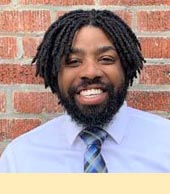
Lezlie Braxton Campbell
Springfield City Council, Ward 3
Lezlie Campbell was born and raised in Springfield, and has lived in Ward 3 for 11 years. He graduated from Springfield Public Schools and is now “a third-year educator and a proud advocate for his students” in the district. A lifelong advocate. Campbell is a Neighbor to Neighbor board member and calls it his movement home, where he has organized on issues such as housing, environmental justice, and police accountability.
While he got his start in movement organizing, Campbell is no stranger to electoral politics. He currently serves as the President of Young Democrats of Massachusetts and is on the Board of Directors of Bay State Stonewall Democrats. He is a member of the Democratic State Committee, Ward 3 Democratic Committee, and Young Democrats of America National Committee.
Lezlie is running for City Council to be a champion for his community by enacting policies that end the systematic disenfranchisement of his community in Ward 3. Lezlie wants to ensure everyone in Springfield has a seat at the table.
Key Policies Priorities
-
Housing: Campbell cites housing policy as a top priority, noting that statewide housing policy conversations often ignore the housing crisis in Western MA. He wishes to promote more affordable homeownership in the city and noted that lots of new development doesn’t align with what residents can afford.
-
Transportation: Campbell is committed to making the PVTA fare free on certain routes, including by using municipal resources. He explained that PVTA cards given to high school students are only valid during certain times of day and that the cost of the service discourages people from staying after school for additional activities.
-
Policing and Public Safety: Campbell believes community policing can only work if police are required to live in the city. However, he also believes that any solution must still acknowledge the fear around policing in the neighborhood. Additionally, Campbell emphasized that interventions to reduce youth crime and violence should focus on alternative activities rather than policing, and that after school activities need to speak to the interests of all kids. He sees out-of-school time as a major area through which the Council can better invest in Springfield's youth.
-
Public Health: Springfield is the asthma capital of the country, and Campbell believes the City Council can do more to address this chromic issue.
Deep Democracy Dynamics
85% of Ward 3 residents are people of color. 56% of residents identify as Hispanic or Latino, 19.3% as non-Hispanic Black, and 15.1% as non-Hispanic White. The ward is heavily Democratic, and Democratic voters there lean slightly more progressive on national candidates than in the city as a whole. Bernie Sanders placed first in the ward with 36.6% of the vote in the 2020 Democratic primary, followed by Joe Biden at 32.9% and Elizabeth Warren at 12.4%
Neighbor to Neighbor, the Springfield NAACP, and the Pioneer Valley Project are three major organizations mobilizing around justice issues in the ward and the city. Campbell is currently a member of Neighbor to Neighbor.
As a public school teacher embedded in movement throughout his community, Campbell has the network to build a robust campaign. He has had several conversations with fellow Maria’s List candidate’s Jynai McDonald and Zaida Govan throughout the cycle and named them as two other candidates he’s excited about; each also mentioned Campbell as an exciting future municipal partner.
Our electoral modeling, centered in both demographic and historical electoral data, finds Springfield and Ward 3 to present key strategic opportunities for progressive gains. With it's combination of voters of color, young people, and past primary electoral results, our Deep Democracy analysis indicates that investments in power-building in Springfield and other Gateway Cities will be vital in building progressive power.
These factors present a strong potential for Deep Democracy effects in Springfield this cycle, both through collaboration between ward candidates and through alignment with progressive incumbents of color in the at-large race. This Deep Democracy alignment is deepened by the connection between each Maria’s List candidate and Neighbor to Neighbor specifically.
Campaign Team and the Field
Campbell has been endorsed by Run for Something and is a Mass Alliance Rising Star. Each of these programs comes with organizing assistance. He is planning on centering youth voices in his campaign and has a youth coordinator to focus specifically on youth organizing and turnout. He sees this organizing as a way to build the base for future power-building in Springfield and says that additional funding would allow him to pay youth organizers and interns. On the whole, he said that his “dream campaign” is “a grassroots campaign that can raise a lot of money so we can invest in people.” He believes in paying people for their volunteer work and wants to make sure that he can raise enough money to do so. He also said that increasing turnout to 1000 voters or more would demand more citywide attention for the ward and undo generations of neglect by campaigns setting their universes, which “play a part in disenfranchisement.”
Incumbent Melvin Edwards has held the Ward 3 city council seat since ward representation was established in 2009. Turnout in the ward lags far behind other wards in local elections. In his last contested election in 2017, Councilor Edwards won with just 392 votes. Campbell also argued that residents lack a clear contact point with city government for reporting instances of police harassment and other harms. Additionally, increasing turnout in Campbell’s ward may help reelect councilors who are aligned with progressive values in at-large seats. Both candidates have automatically advanced to the general election on November 2nd.
Fundraising & Opportunities for Giving
Contributions to Lezlie Campbell are particularly valuable because he is a public school teacher and state law precludes him from directly soliciting contributions. Despite this obstacle, his campaign has raised more than $10,000. He described his “dream campaign” as investing heavily in staff, especially in paying volunteers who are new to electoral organizing for their labor, and an influx of cash for him would help build the base in Springfield. He accepts contributions through his ActBlue.

Neighbor to Neighbor Massachusetts - Action Fund
Established in 1996, Neighbor to Neighbor is a movement organization that builds power in its core cities; Worcester, Holyoke, Springfield, and Lynn. Their membership is made up of workers, immigrants, women, and people of color. Members of N2N have been on the frontlines of every progressive Massachusetts victory including, but not limited to, Massachusetts CORI Reform (2010), interpretation justice for parents in Lynn (2013) and earned sick time and increased minimum wage (2014. In 2020, they were critical in advocating for a justice census collection, and provided mutual aid in light of COVID19. Additionally, Neighbor to Neighbor delivered one of the only 2020 victories for Massachusetts progressives when Senator Adam Gomez defeated incumbent Jim Welch. Senator Gomez was a City Councilor and longtime Neighbor to Neighbor member.
Neighbor to Neighbor is planning to replicate the success they saw in 2020 with the Springfield City Councilor races this year. While they are currently in the process of endorsing candidates, their membership is committed to turning out working class and infrequent voters in all wards across the city. Although it is early in the cycle, Neighbor to Neighbor has been encouraged by certain candidates in the race focusing on major issues facing the community right now such as policing, education, and housing.
Neighbor to Neighbor’s long-term vision is for Massachusetts Gateway Cities to become hubs of economic activity led by working class people and immigrant communities, and their electoral organizing this year plays an integral role in this approach. On a statewide level, they are part of the Coalition for Worker Ownership and Power, fighting to expand worker ownership for an equitable economic recovery. In Springfield, they are working closely with Wellspring to support worker cooperatives. Neighbor to Neighbor mobilizes the base that delivers political and policy wins for a new economic system based on solidarity Neighbor to Neighbor’s most urgent need is for 501(c)4 funding to support their voter mobilization efforts this year, and their power-building approach means that investment in this year’s elections will make a long-term positive impact on the solidarity economy in and around Springfield. The three candidates we recommend in Springfield are each core Neighbor to Neighbor members — as is Springfield City Council incumbent Victor Davila. An investment in Neighbor to Neighbor is an investment both in the movement that will elect them and in the movement that will fight for worker-owned cooperatives, environmental justice, and community wealth alongside them when they are in office.
To donate to Neighbor to Neighbor’s 501(c)4 organizing efforts this cycle, please donate to the Neighbor to Neighbor Massachusetts Action Fund.
